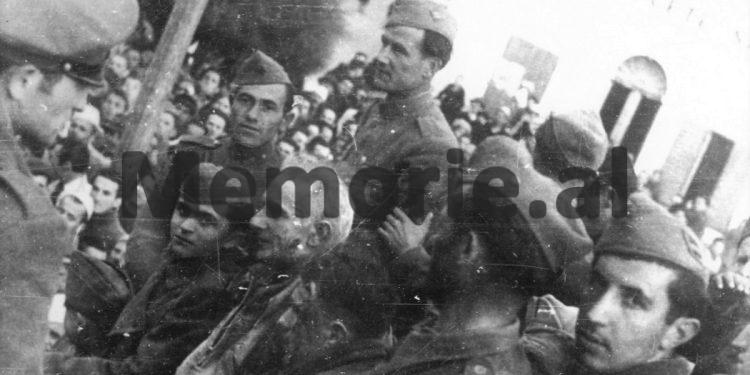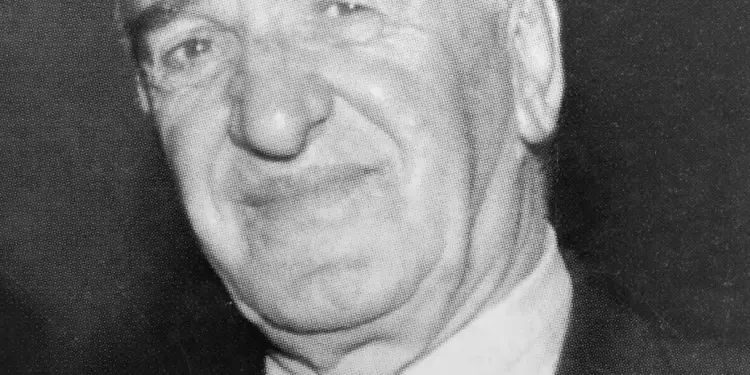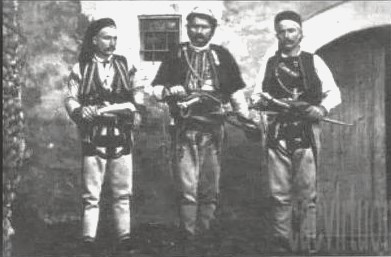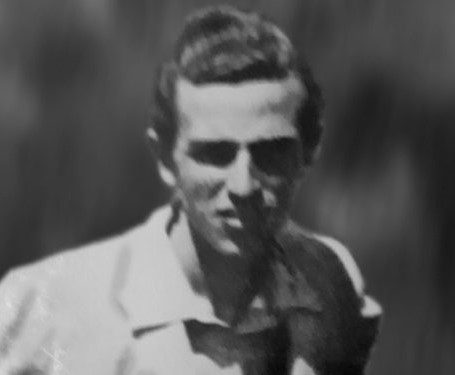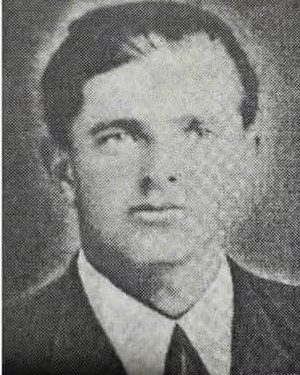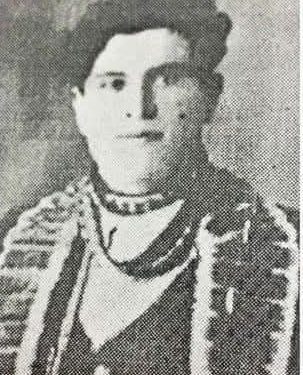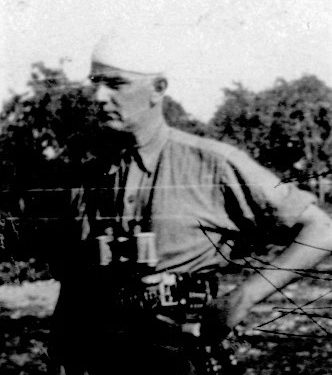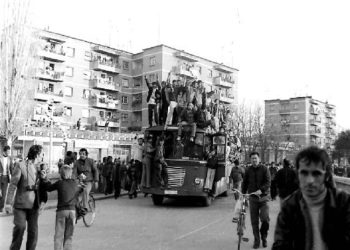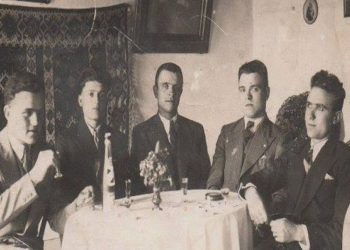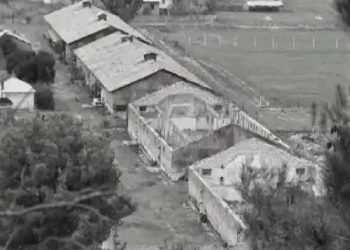By Ahmet Bushati
Part eight
Memorie.al/After the flag was altered in 1944 with the addition of the communist star, Shkodra transformed into a center of resistance against the regime, paying a high price for its tradition of freedom. By April 1945, high school students, already feeling betrayed by the promises of the war, gathered to oppose the new terror that imprisoned and killed innocent people. Communism turned Kosovo into a province of Yugoslavia, while Shkodra was punished for its “historical crime”- its defiance against invaders. The “Postriba Movement” became a tool to suppress all dissent, plunging the city into an unprecedented spiral of suffering: imprisonments, executions, and the destruction of families. The high school students, alongside citizens, became symbols of resistance, while some “young communists” turned into tools of the State Security, leading to expulsions, imprisonments, and internments.
Four times, Shkodra rose in armed rebellion, but history forgot these battles. This book is written to remember the countless prisoners, the tortured, the killed, and the parents who suffered in silence. It is a warning against dictatorship and a plea for future generations not to forget the sacrifices made for freedom.
Continued from the previous issue
In the Footsteps of a Diary
Shkodra in the first years under communism
After the occupation of Albania, Llesh Marashi would be among the first, – if not the first – in the entire Shkodra area, who, with arms in hand, had gone out into the mountains to fight the invader, as the patriot and legalist that he was. After the capitulation of Italy, as we know, the Germans had entered Albania on their path of gradual withdrawal to Germany. At this time in Tirana, a government headed by Rexhep Mitrovica was formed; a government that, like most nationalists at that time, would not consider the temporary and transitory stays of the Germans in Albania an occupation. Thus, Llesh Marashi, – like all the other legalists who had fled until then – came down from the mountains and was entrusted by that government with the duty of District Commander for Shkodra, having as his colleague Shaban Elezin, in the duty of District Commander.
The coming to power of the communists would bring Llesh Marashi back to the mountains. Two months of murder, imprisonment and reprisals by partisans everywhere in Highland were enough for that Kreshnik area to turn into a powder keg, ready to explode at the first opportunity. In addition to Llesh Marashi, other groups of fugitives were circulating in Highland at that time. Even the verses sung by a lamenter named Tone Kuqia, on the occasion of a death, perhaps shed some light on the situation in question:
“Woe to you, Highland,
The house is burned to ashes.
There is no more leaf or grass,
The best men are tied to ropes.
You tied our huts with wire,
Bad in Kastrat and blacker in Shkrel,
And in Kelmend neither a hen nor a rooster crows.
—
But it will not go away, for a long time,
I leave you to your sons to rise up to the throne”!
The Llesh Marashi uprising had not been predicted for the day it happened. It was sparked completely by chance and for an insignificant reason. Highlander Luket Marashi, from the “Grishaj” neighborhood of Shkreli, was known by everyone to be the main shelter of Llesh Marashi, so on January 23, 1945, a day during which it was snowing, the People’s Defense forces were looking to arrest Luket Marashi, at the time he happened to be above the village with Llesh and his platoon.
The partisans, worried that they were not going to catch Luket, raided his house, taking everything they found inside, such as livestock, food, etc., and finally set it on fire. Meanwhile, the group of escapees from above the mountain, until then those scenes were following them with great anger, and if they could not hold back any longer, they were persistently asking Llesh to allow them to open fire. It is said that Lleshi, who hoped for an uprising of all the mountains known, tried to curb the impatience of his warriors, repeating to them several times that; “an uprising on that day would be premature and with unnecessary consequences”! It is also said that in the future, those warriors were no longer holding back, as much as Lleshi himself, with his silence, as if he was finally approving the attack.
After the detachment was unleashed with fury on the partisans, the village was also suddenly on its feet with weapons in hand. As a warning, the bells rang in Shkrel, and very soon they were heard to ring in Kastrat as well. It was not long before echoes of the bells were coming from Reçi. The enthusiasm of the highlanders who ran with weapons in their hands was at its peak, but unfortunately, that uprising would lack organization, as suddenly as it had erupted and since the agreement had not been reached with the fugitives and other mountaineers. However, the attack of the highlanders was so lightning that the forces of the “People’s Defense” retreated almost without resistance and in great panic, when each of them would only think about how to save his own head!
Some of them hid where they could and others surrendered. But in any case, the war would continue place after place and would have its casualties. Thus, in the ongoing war, the commander of Bajza, Jonus Naçi, (father of the commissar of Malësia e Madhe, Çun Jonuzi) was killed. Along with him, the officer of that post, Myftar Sokoli, was also killed. In the following, the posts of Shkreli, Bajza and Gruemira were surrendered one after another, as well as Koplik itself.
The unstoppable attack of the highlanders, although partially armed, could not be stopped, for which they would be paid for that day with the blood of some of the bravest. Thus, in the church of Shkreli, Marash Tomë Gjeloshi would be killed. Shkreli’s men, after quickly taking the Dedaj post, would attack the Bajza post, for which Pjetër Gjoka would fall. Zef Toma, the young officer who had been placed in charge of the Grishaj, would also be killed, and next to him another mountaineer, Lulash Cuku. At the end of that day, Luigj Kolë Shetaj and Mirash Gjoni would also be killed fighting. Meanwhile, the scene of the uprising, there were other events:
There had been a time when, among others, a partisan brigade of Luma was operating in Malsi, with commander Njazi Hoxha, who, on the occasion of this uprising, had taken refuge in the house of Zek Zeneli, from the “Mehaj” neighborhood of lower Koplik, who, as usual, had welcomed his friend, having told him that if he failed, the house would be turned into a fortress. Njazi Hoxha, – as the owners of this house would tell us – had calmed down when he heard that at the head of the insurgents, stood Llesh Marashi, with whom he had known each other since several years ago, when they had served together as soldiers in Burrel, since Llesh was his superior.
Once the surrendered Hoxha, Llesh Marashi treated him as a friend, and all his forces captured on that occasion, he released him without touching him and with all their weapons. Llesh also released the partisans who was in Koplik, for whose capture, the house of Shaban Binaku deserves to be singled out…! It may seem a bit strange that among the insurgent mountaineers, there were also two Kosovars, the brothers Shemsi and Hamdi Ferri, nephews of the patriot Jakup Ferri, the first a former officer and the other a merchant, who had fled Kosovo due to the violence that the Serbs were exercising there. They had fallen as friends in the well-known house of the Aliajs of Kastrati.
The uprising in question had conquered the entire surrounding area and reached the Rjollit Bridge, where two of the bravest insurgents were killed: Gjon Martin Lula and Mirod Paloka, both from Bajze. The Highlander in prison, laughing, would tell us how Çun Jonuzi, after these events, as a commissar who continued to be for Malsinë, had intervened several times near the command of the People’s Defense Forces, blaming many Highlander for the murder of his father. So annoying had Çun been to those officers, that one day one of them had said to him: “And you Çun, how many fathers have you had?”
Kelmendi’s heroic resistance
It had been a month and a half since the war had ended and by then, everywhere in Albania, the communist power, the so-called popular power, had been established, and yet, on the evening of December 31, 1944, few in Albania could remember that it was New Year’s Eve 1945! Especially for Shkodra and its surroundings, that short period of no more than a month of communist power was enough to convince the majority of the people that the sensational promises of the War that had just ended had been nothing more than a true fairy tale. Numerous raids on houses, looting of goods in the name of the people, imprisonment and murder of people with and without partisan trials, would be those daily events that Shkodra was forced to experience with a heavy heart.
Only distant Kelmendi, a nest of mountain ridges completely covered with snow, would continue to remain sovereign as the weather, among its lands still unexplored by the partisans, something that almost no one in Albania knew and would not believe. Until then, Kelmendi had heard what had happened and was continuing to happen to Shkodra and the other four Bajraks of Highland, with whom he was a brother, and was waiting his turn to be independent, although not without a fight.
It had been a month since the partisan brigades had come to Rapshë i Hotit, where they had stopped. Their headquarters, led by Mehmet Shehu, who was also being investigated there for the numerous crimes he had committed, was located right there, in Rapshë i Hotit. Kelmendi, for his part, had decided to fire on the partisans as soon as they set foot on his land, and Rapsha had promised that in such a case, he would inform Kelmendi in due time. Until the day the war broke out, Kelmendi would keep watch day and night with his sons, who would take them one by one to designated observation points.
The cold night of December 31, 1944, had been the last that the people of Kelmendi – although not without concern – would pass without a fight and within their homes. That night, as after the word related earlier, Rapsha informed Kelmendi that the partisan forces had set off for Tamara, and the bajraktari Mark Gjeloshi, for his part, immediately fired the cannon everywhere in Kelmendi, whose villages would have enough time to gather themselves together. Without knowing if, in this case, there would be any known mountaineer soldiers, Nikçi and Vukli decided to send them to defend Kelmendi, one per tribe – a tribe – while Selca, for its part, wanted to defend itself within its borders, although some of its bravest sons, such as Gjeke Selca, Gjergi Lula, etc., rushed to join the fighting as soon as possible, along with their brothers of a bajraku.
It was still night when the partisan forces arrived at the border with Tamara and it would continue to be night when Commissioner Fejzi Micoli, at the scene of the attack, would fire the entire magazine of his automatic rifle, in response to which, a mountaineer ambush, would mortally wound him. The war had just begun and would continue fiercely throughout the day, marking rare episodes of bravery on both sides, but finally, before nightfall, the defeated partisans would retreat, leaving behind on the battlefield several dead and a lot of war material in the hands of the mountaineers, such as rifles and cartridges in abundance, five machine guns, a mortar, three mules and forty pairs of handcuffs, for the anticipated arrests.
In defense of Kelmend that day, his brave sons, such as Rrok Pretashi, Ndue Zef Nikolla and Kolë Mark Deda, three from Vukli, would die, and ten others were wounded, while in the house of a mountaineer, the former commissioner Fejzi Micoli had died, despite the great interest that, as usual, the mountaineers had shown in saving his life, and in particular, Gjekë Selca himself.
It is said that the partisan command, before sending forces to Kelmend, called the mountaineer Kolë Maçi, to get his opinion, regarding the fate of the war that was on the verge, and it is said that he had replied: “Kelmend is difficult to take”, – a prognosis to which Abas Fejzo, commander of one of the brigades, had responded, having pointed out that; “those partisans had carried out successful battles even with the Germans”.
After that first day of fighting, a week would follow without fighting, but of course, without ever being completely calm. Kelmendi, as before, would continue to stand guard, knowing full well that he was surrounded, beyond his mountains and hills, if necessary. The highlanders knew all this and their early instincts would strike them, for self-defense and resistance.
At the end of a week, the partisan forces, rushing like wolves through the darkness of a sleepless night, with the idea of coming up behind the mountaineers and catching them by surprise, would change direction and cross a roadless road, climb the “Kapë të Hotit” and finally reach Broja. But Broja, which this time was the partisans’ goal, – although quite far from Tamara, from where you regularly enter Kelmend – would remain alert and, as they say, with their finger on the trigger.
She would successfully withstand the partisans’ surprise attack, thanks first of all to her own caution and bravery, and then to the brotherly help that had come to her immediately from Vukli and Nikçi. The fighting in this case lasted several hours and was quite fierce, until finally the partisans were again defeated, leaving behind several dead. On the side of the highlander that day, Zhuk Toma from Brojete, Kolec Uci from Triepshi was killed, while Lukë Toma and Dedë Gjon Bajraktari were removed from the battlefield, with several wounds received in the body.
The remaining three weeks of January and the first of February would be characterized by occasional efforts between the two sides, without excluding any deaths, as would be the case, for example, of a Pjetër Zef Koci, from Brojete, and perhaps some others, but without there ever being a war in the full sense of the word. During all this time, the partisan command, there in Rapshë i Hotit, would continue to deal with the most complete preparation for the final conquest of Kelmendi. Thus, the 1st, XXIIIth and XXVIth Brigades, one day surrounded Kelmendi from all sides, including from behind, from the side of Gucië, this brigade that had come to the aid of the Montenegrin partisans, despite the “reactionary” forces of the Albanians of Plavë-Gucië.
It was the end of the first week of February, when the multiplied partisan forces, furiously attacked Kelmendi from all directions, who for his part, although aware of the final fate of the fighting, still, thanks to his bravery and patriotic spirit, had decided to fight again, but of course, he could no longer face the large number of partisans of the three brigades, well-armed. Thus, after five weeks of glorious resistance and having been granted an amnesty that coincided with that occasion, as well as the oath given by the commanders of those brigades themselves, Kelmendi finally laid down his rifle, having been subjected to such treacherous and merciless terror of reprisals that “would make a child tremble in its mother’s womb”!
The partisans on that occasion would cruelly kill several young men and women from the mountains. Thirteen houses in Vukli and Nikçi would be set on fire at once. All the property of the participants in the war would be taken. Dedë Gjon Bajraktari and Lukë Toma, who continued to suffer from wounds received in the fighting in Broja a few days earlier, would be burned alive inside their homes, because the cruel partisans would not allow their families to take them outside.
When Kelmendi was captured, the partisans again declared an amnesty, according to which all those who had participated in the war were to be spared if they surrendered within a certain period of time. Yes, had they believed the communists?! Did they want to believe the treacherous?! However, Kelmendi, as usual and in respect of their word, believed them.
The first to ask to surrender were three young men from Brojet, who, as soon as they came out of a cave where they had taken refuge, were executed on the spot by a group of partisans without warning. On the way, the partisans met the brave mountain woman, Katrina Toma, who was holed up in a cave with Prenk Cali, his son and daughter, Gjeloš and Tona, and since she did not tell them where the cave was, they escaped inside and shot her on the spot, right on the main road.
In Broja, the partisans, not respecting the promises of amnesty in this case either, would shoot on the spot, the three surrendered sons of Mark Biku, and for even greater cruelty, in the yard of the house and in front of their two parents. At the same time, in a forest in Vukli, their cousins, Lucë Gjon Rapuka and Zef Rrok Rapuka, as well as Fran Zef Bajraktari, were shot. Lucë Gjon Bajraktari, brother of Dede Bajraktari, was also shot and burned alive inside his house. Memorie.al




